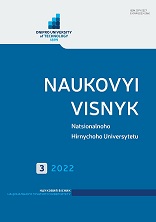

 | Наукова періодика України | 
| Naukovyi visnyk Natsionalnoho Hirnychoho Universytetu |
Pylypenko Yu. Pathway of the institutional develop-ment: practice of liberal transformation in Ukraine and Belarus / Yu. Pylypenko, H. Pylypenko, N. Lytvynenko, O. Tryfonova, E. Prushkivska // Науковий вісник Національного гірничого університету. - 2019. - № 4. - С. 120-127. - Режим доступу: http://nbuv.gov.ua/UJRN/Nvngu_2019_4_22 Purpose. To identify specific features of the mechanism of institutional changes in the countries of post-socialist transformation and to determine the effect of informal norms upon the pathway of institutional development in Ukraine and Belarus. Methodology. Theoretical and methodological basis of the research is represented by theoretical synthesis of non-institutional and traditional versions of the idea of institutional changes expressing the concepts of spontaneity and premeditation as for selecting the institutions depending upon economic, political, and sociocultural conditions of the national economy development. Quantitative evaluation of the effect of culture upon the pathway of institutional development in Ukraine and Belarus was performed basing upon the Values Survey Module 2008 methodology proposed by G. Hofstede. Comparison of the tendencies and results of liberal transformation in post-socialist countries was based on the logical and historical method. Findings. It has been demonstrated that the pathway of institutional changes in any society is determined by spontaneous processes and means a conscious choice of the development course through the establishment of principally new institutions and/or their borrowing from other more progressive systems. Restricted nature of the dominating ideas concerning the completeness of institutional reforms at certain historical stage by means of establishing stable relations between the borrowed institutions and proper institutional environment has been shown. Analysis of the practice of liberal transformation in Ukraine and Belarus has been used to prove the possibility of achieving a high level of adaptation of a new institution to the available informal norms in the context of general inefficient pathway of the institutional development. Originality. For the first time, qualitative evaluation of the internal constituents by means of value indicators by G. Hofstede has been applied to describe informal norms of the institutional environment in Ukraine and Belarus characterizing the Path Dependence effect. The obtained data have made it possible to define the degree of inconsistency between formal and informal institutions of transformational economy. Effect of blocking in the development of the Ukrainian economy has been identified; the effect is observed in the context of a repeated situation when balanced but inefficient norms are self-supported in the institutional environment of the country decelerating its development. Practical value. Scientific ideas concerning the mechanism of institutional changes, proposed approaches to evaluate informal institutions, and determination of the level of their consistency with formal rules can be the basis for more efficient control of the process of institutional changes. Цитованість авторів публікації: Бібліографічний опис для цитування: Pylypenko Yu. Pathway of the institutional develop-ment: practice of liberal transformation in Ukraine and Belarus / Yu. Pylypenko, H. Pylypenko, N. Lytvynenko, O. Tryfonova, E. Prushkivska // Науковий вісник Національного гірничого університету. - 2019. - № 4. - С. 120-127. - Режим доступу: http://nbuv.gov.ua/UJRN/Nvngu_2019_4_22. |
|
|
Всі права захищені © Національна бібліотека України імені В. І. Вернадського |
|||||